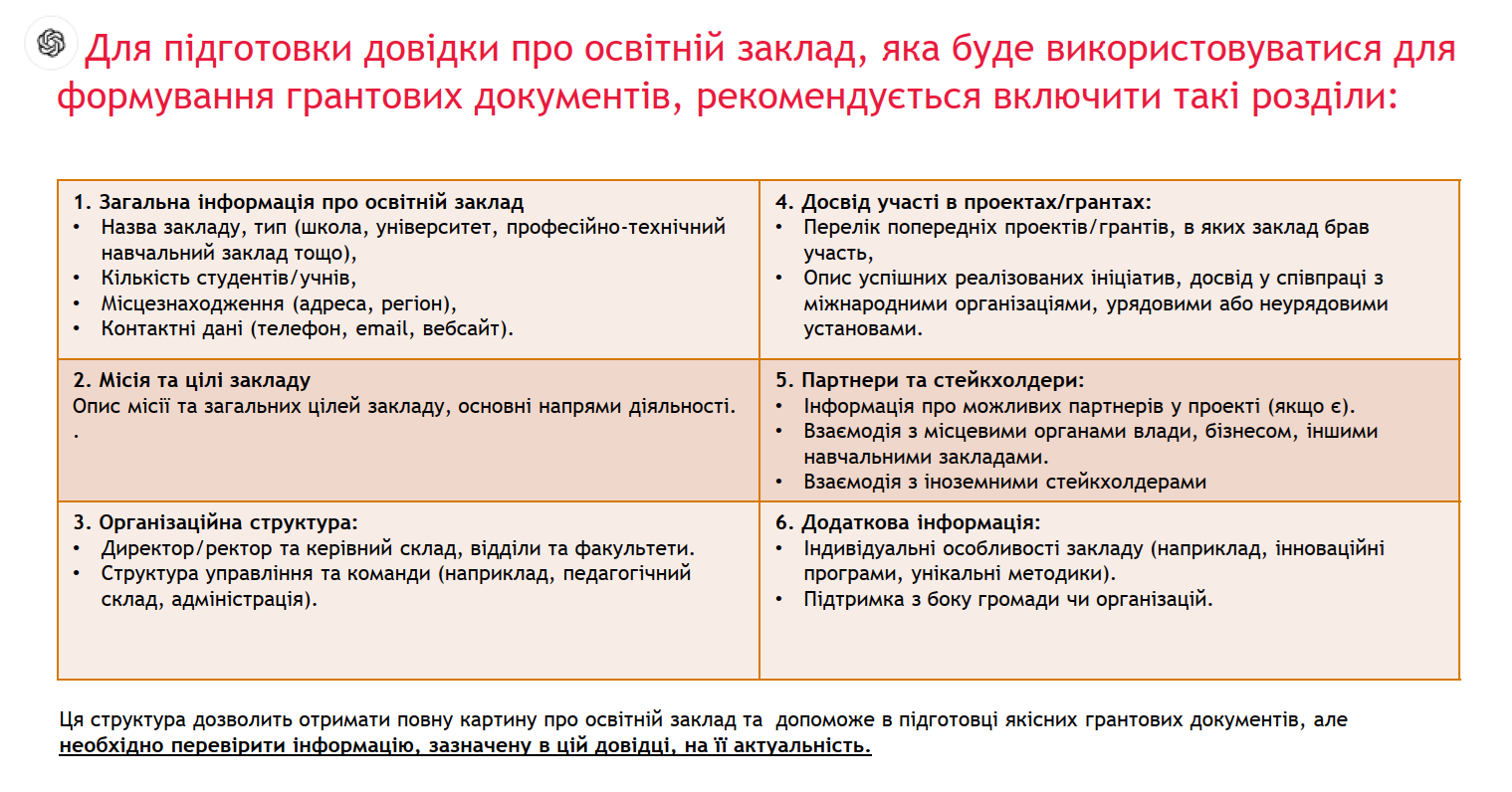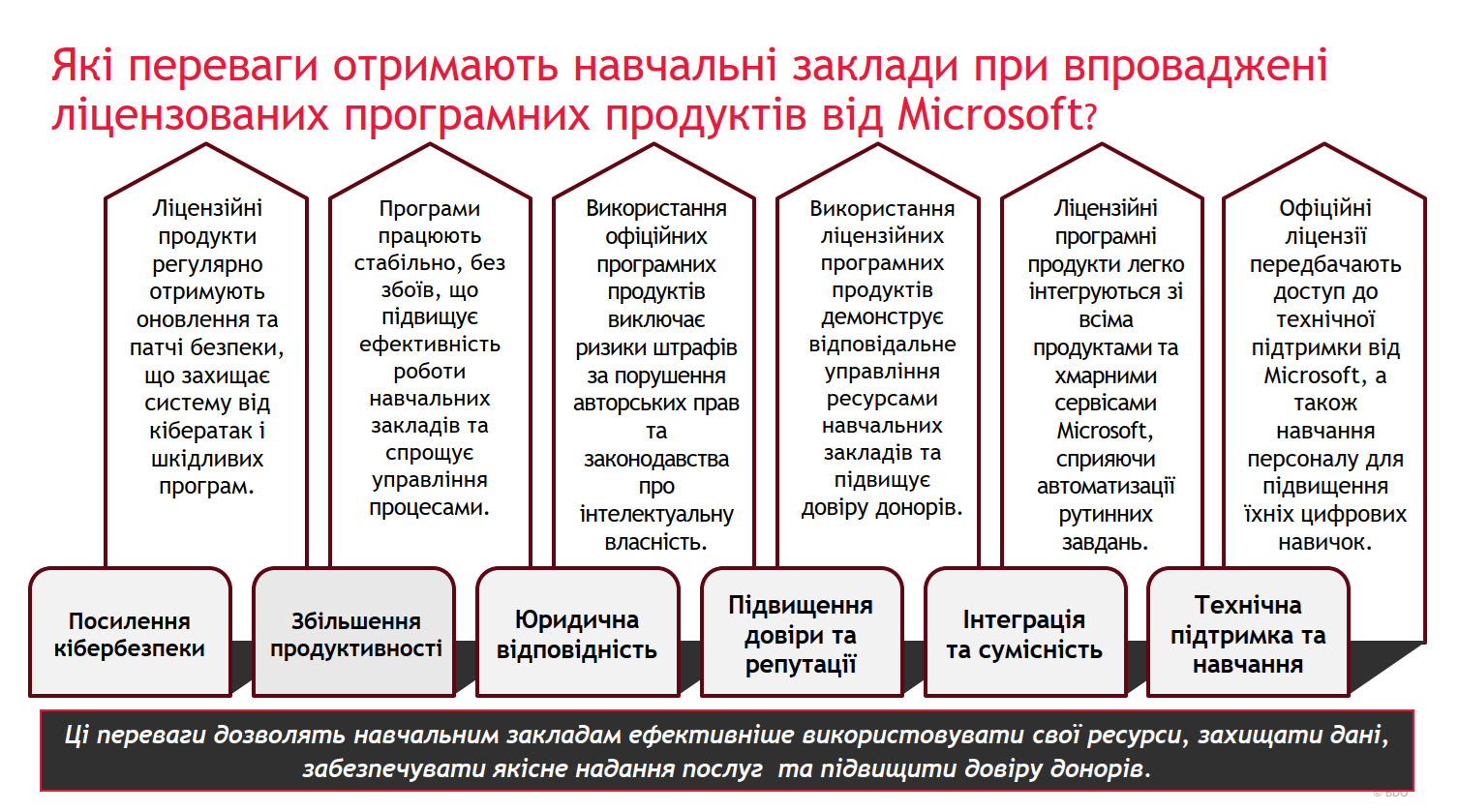The objective of the event is to enhance the professional potential of representatives of educational institutions by showing them practical artificial intelligence tools and modern digital technologies to optimize management and educational processes.
The event covered practical cases of using artificial intelligence to automate document translation, create effective presentations, and set up chatbots to solve routine tasks. The speakers emphasized the importance of integrating AI into the daily work of educational institutions to reduce the workload of experts and accelerate the implementation of innovative solutions.
The invited speakers shared practical advice on implementing AI, its tools, and technologies that can be applied today. The focus was on the importance of thoroughly checking the data and materials generated by AI to ensure their accuracy and reliability. Because no matter how useful artificial intelligence can be, it will never replace humans; it only helps to automate and simplify certain processes.
The webinar participants took a survey on digitalization and AI implementation to assess the needs and identify areas for the development of their professional competencies, which will facilitate the effective implementation of acquired knowledge and technologies in the activities of educational institutions.
Practical solutions for educational institutions: how artificial intelligence simplifies translation, automation, and content creation
Tetiana Okseniuk, Chief Expert of Artificial Intelligence Implementation, offered valuable insights and practical guidance on several key topics. These included strategies for initiating AI projects, establishing specialized chatbots tailored to the needs of educational institutions, and leveraging automated translation technologies for efficient document management. Furthermore, she addressed the nuances of translating PDFs while preserving formatting, a skill that facilitates more efficient information processing.Special attention was paid to creating presentations with the help of AI. Tatiana presented tools that help to quickly develop interactive and aesthetically pleasing slides. She also demonstrated a practical case of using Copilot in PowerPoint to automate this process.
Key points of the speech:
1. Start working with artificial intelligence (AI):
- How to choose the right AI provider depending on the needs of the educational institution.
- Tips on how to create clear and relevant queries for working with AI to ensure the most accurate results.
- Using tools such as DeepL to automate the translation of documents, including PDFs, while preserving formatting, to eliminate language barriers in academic and management activities.
- How AI can help translate scientific and educational materials to provide access to the latest knowledge in different languages.
- Use of specialized chatbots to automate routine tasks in educational institutions, such as answering student queries or administrative processes.
- Tools and methods to quickly customize bots to meet the needs of an institution.
- Practical advice on how to use Copilot in PowerPoint and other tools to create engaging and visually appealing presentations.
- Tips on how to use AI to automate slide creation, develop content using ChatGPT, and create effective design and interactive elements.
- How AI helps to optimize management processes, reduce staff workload, and accelerate innovation.
- Recommendations for implementing AI to increase the competitiveness of educational institutions.
Participants learn to apply these practical tips and tools in their work today to significantly improve their performance.
Tetiana Okseniuk emphasized that artificial intelligence is not merely a future technology, but rather a valuable tool in the present that can help educational institutions work faster, more efficiently, and open up new opportunities for development.
Artificial Intelligence in grant activities: how to automate application preparation and win competitions
Tetiana Demchenko, Head of Local Government and Grant Support at BDO in Ukraine, shared practical tips on using artificial intelligence to analyze grant documentation and prepare applications. Her presentation included a demonstration of three practical cases that showed how to effectively integrate AI capabilities into the process of applying for grants and analyzing supporting documentation.
Key points of the speech:
- Creating an information certificate about an educational institution. Tetiana demonstrated the use of artificial intelligence (AI) to swiftly generate a comprehensive certificate for an educational institution, aligning with the structure of most application forms.
- Filling in the application form with a few useful links. Even with a limited set of data (only a few links), artificial intelligence can automatically fill out an application form for participation in grant competitions. Tetiana emphasized the importance of properly formulating queries to ensure that AI can effectively complete the task using a minimum number of attempts.
- Documentation analysis in seconds. Artificial intelligence enables rapid documentation analysis, highlighting key points, and providing clear conclusions. This saves ample time when preparing grant applications.
- Effective use of queries in free AI tools. Tetiana emphasized the significance of strategic utilization of a limited number of queries in free AI tools, such as ChatGPT. She provided recommendations on how to optimize the use of these features for document preparation.
- Preparation for participation in grant competitions. The use of artificial intelligence can greatly facilitate the work with application forms, automate routine processes, and increase the chances of educational institutions to win grant competitions.

“Artificial intelligence has the potential to transform the landscape of educational institutions,” Tetiana Demchenko stated. “It enables them to develop grant applications for competitions that previously seemed daunting with greater speed and precision.”
The presentation offered a wealth of practical insights and actionable tools that the participants can readily implement in their work processes.
Creating a secure and productive digital environment for educational institutions: Microsoft’s role in today’s challenges
Andrii Paios, IT Director at BDO in Ukraine, emphasized the need to build a reliable technological foundation for educational institutions as a basis for the effective use of digital tools and cybersecurity.
Key points of the speech:
1. Role of the technological foundation in organizations:
- No digital tools will bring the expected benefits unless the organization has a proper technological foundation.
- Andrii emphasized the importance of creating a secure, efficient and integrated digital environment that will be the basis for work.
- In today’s environment, when educational institutions are often targeted by hackers, especially by aggressor states, cybersecurity is a critical issue.
- Most attacks (up to 75%) are carried out via e-mail, so the use of secure communication channels is mandatory.
- Recommendations for avoiding insecure platforms (e.g., Telegram) in favor of proven corporate solutions such as Microsoft Teams.
- Use Microsoft products to create trusted channels for correspondence, file sharing, and task management.
- The ability to obtain free or significantly discounted licenses for educational institutions to integrate advanced tools such as Microsoft Teams, Copilot, Planner, and more.
- Integration of these solutions ensures collaborative working on documents, centralized data storage, and increased team productivity.
- Using official software enhances the reputation and trust of international partners and donors.
- Obtaining educational institution status with Microsoft to access preferential terms.
- Determining the required licenses according to the organization’s needs.
- Creating and customizing a Microsoft Tenant workspace for efficient use of the tools.
- Constant updating of the software and adapting to new features.

Andriy noted that BDO in Ukraine, as a Microsoft Gold Partner, provides technical support, advice and training for educational institutions to ensure the effective implementation of modern tools.
“Without a reliable technological foundation, an organization will not be able to use digital tools effectively. Ensuring cybersecurity and implementing advanced solutions is not only a demand of time, but also a prerequisite for the successful operation of educational institutions,” said Andrii Paios.
Artificial intelligence and digital development of finance: changes in the finance profession
Nataliia Vovchuk, Head of South East Europe at Association of International Certified Professional Accountants (AICPA, USA & CIMA, UK), delivered a presentation on the significant changes that artificial intelligence and digital technologies are bringing to the finance profession. She emphasized that these technologies do not replace humans in the profession but rather support and facilitate the development of new competencies among financial professionals. She highlighted the growing importance of data analysis, pattern recognition, and interpretation skills, as well as the effective use of artificial intelligence to automate processes and inform decisions. This shift, she noted, presents new challenges and opportunities for financiers, who must play an active role in choosing the right infrastructure and working with data.“Technologies, particularly artificial intelligence, have a significant impact on the evolution of the financial sector. However, these technologies do not substitute for human expertise. Instead, they enhance and expand the role of financial professionals. It is essential for financiers to adapt to new realities, master modern tools, and utilize data to make informed decisions. It is crucial for experts to be involved not only in the selection of technologies but also in their implementation in real-world processes to enhance efficiency and ensure proper control,” Nataliia Vovchuk stated.
Automation for effective management: how cloud technologies change organizational processes
Andrii Borenkov CFA, Head of Advisory at BDO in Ukraine, shared his experience in implementing automation and integrating modern technologies for educational and non-profit organizations. He noted that while artificial intelligence is making significant strides in content and structured text creation, traditional automation methods remain important and useful.He shared an example of automation for the Alumni Association of the National University of Kyiv-Mohyla Academy. There, Microsoft Dynamics 365 was used to automate member registration, track membership fee payments, and send reminders. The system also allows for automatic communication with members and access to internal resources. This solution reduces costs and increases the efficiency and transparency of processes through integration with other Microsoft tools.
Andrii concludes: “Automation is an essential tool for organizations seeking to effectively manage large amounts of data and optimize internal processes. The use of cloud technologies reduces implementation costs and provides the flexibility to customize systems to meet the specific needs of the organization. Automated process tracking and analytics generation significantly increase management efficiency and allow you to focus on strategic tasks.”
The event demonstrated that AI is not only a tool of the future but can already meaningfully reduce the workload of employees in educational institutions, optimize their work, and promote innovation. Participants received useful tools and practical recommendations that can be applied directly in their work, improving administrative processes and increasing the competitiveness of institutions. However, it is always necessary to verify the information generated by artificial intelligence.
One of the main conclusions of the webinar was the importance of a proper technological foundation for the effective use of digital solutions, especially regarding data security and cybersecurity. The event emphasized the importance of integrating modern tools, such as artificial intelligence and Microsoft solutions, for the development of educational institutions in the face of digital change.
If you need more detailed advice on the use of artificial intelligence and automation of routine tasks, please contact us.
